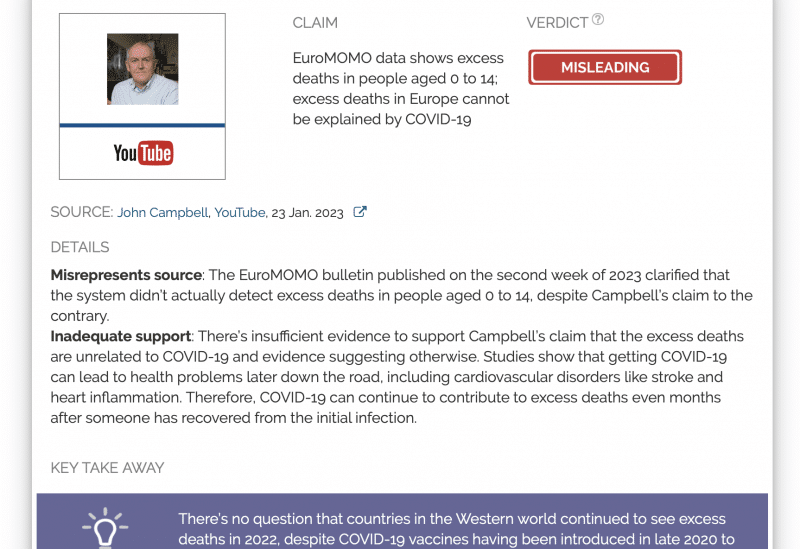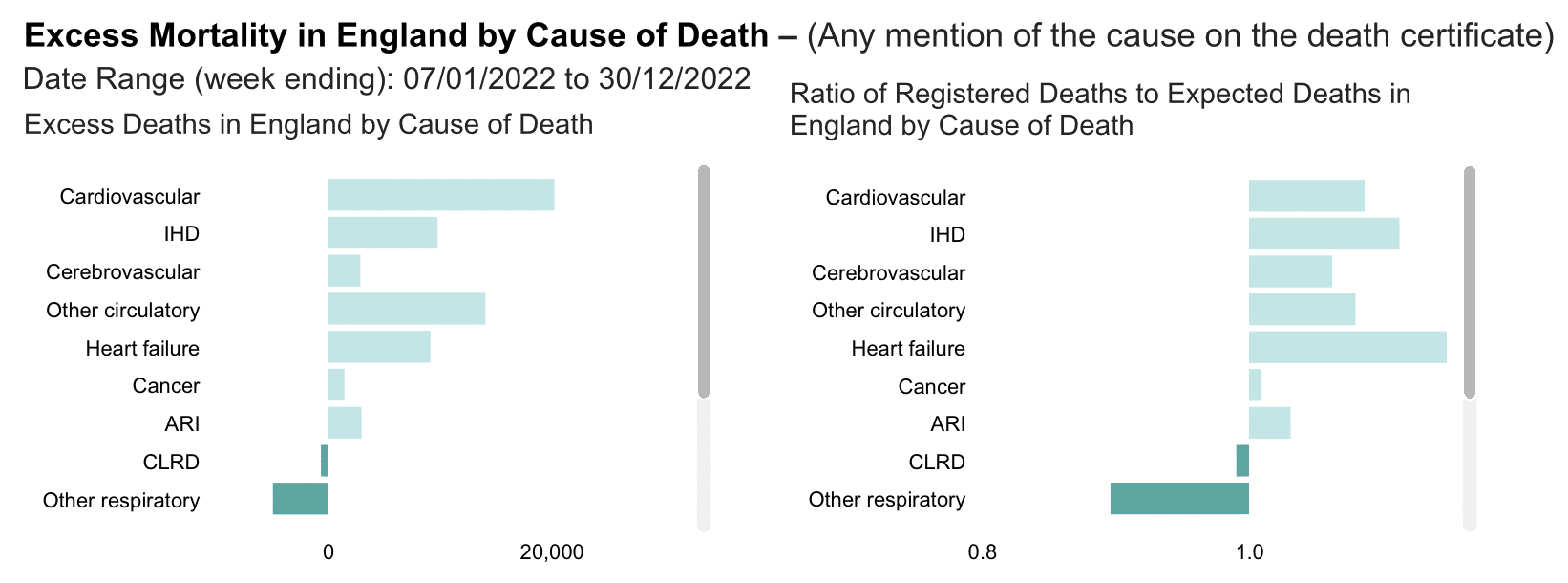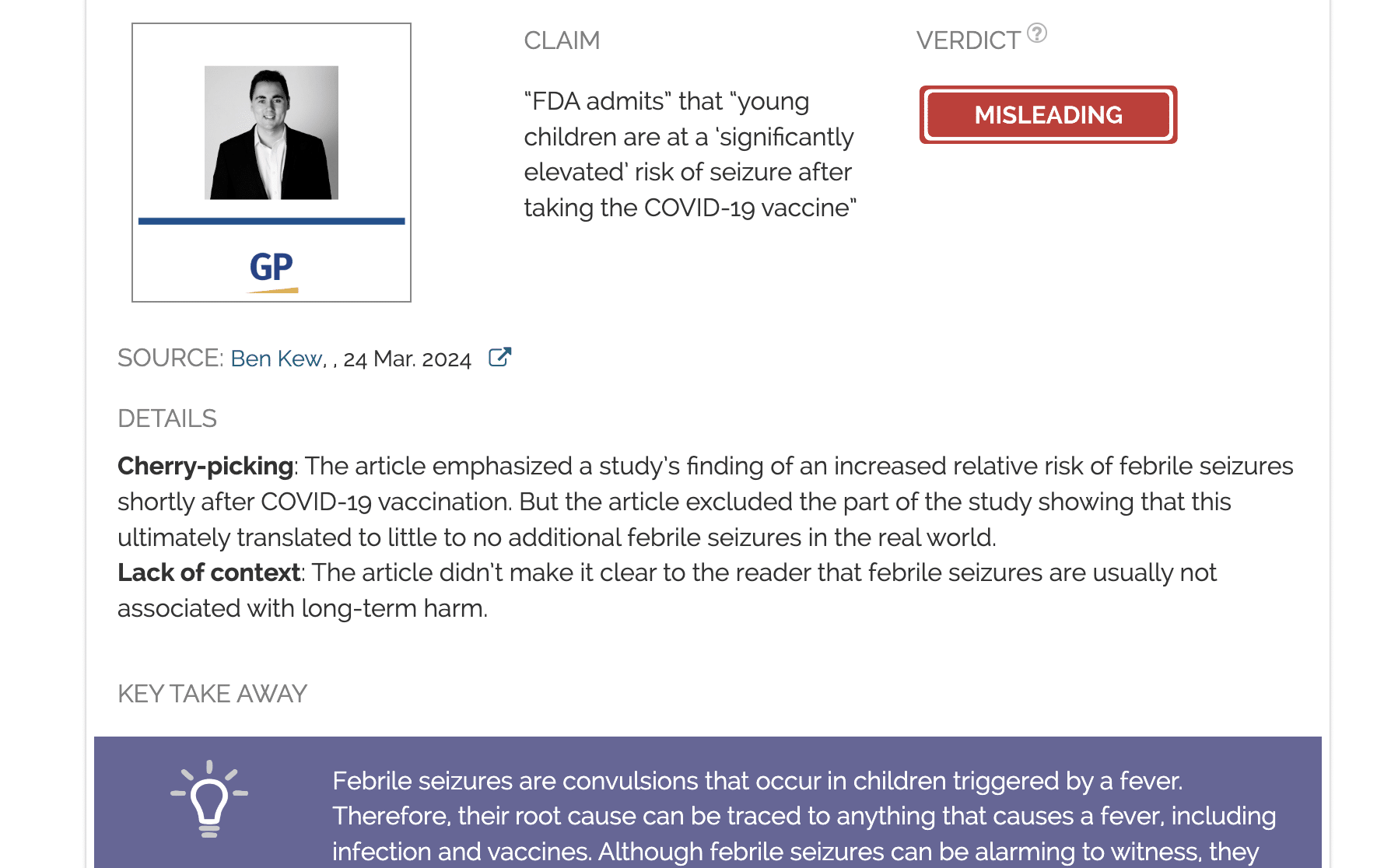- Health
Studies indicate that COVID-19 vaccination doesn’t increase risk of death, despite misleading video on Europe excess death by John Campbell
Key takeaway
There’s no question that countries in the Western world continued to see excess deaths in 2022, despite COVID-19 vaccines having been introduced in late 2020 to combat the pandemic. Vaccine skeptics have expressed the view that COVID-19 vaccination is to blame for these excess deaths. However, published studies show that vaccinated people aren’t more likely to die than unvaccinated people. This view is therefore inconsistent with the scientific evidence. Various other issues, such as long COVID and strain on healthcare systems, are more plausible explanations for excess mortality.
Reviewed content

Verdict:
Claim:
EuroMOMO data shows excess deaths in people aged 0 to 14; excess deaths in Europe cannot be explained by COVID-19
Verdict detail
Misrepresents source: The EuroMOMO bulletin published on the second week of 2023 clarified that the system didn’t actually detect excess deaths in people aged 0 to 14, despite Campbell’s claim to the contrary.
Inadequate support: There’s insufficient evidence to support Campbell’s claim that the excess deaths are unrelated to COVID-19 and evidence suggesting otherwise. Studies show that getting COVID-19 can lead to health problems later down the road, including cardiovascular disorders like stroke and heart inflammation. Therefore, COVID-19 can continue to contribute to excess deaths even months after someone has recovered from the initial infection.
Full Claim
EuroMOMO data shows excess deaths in people aged 0 to 14; “The chief medical officer in the U.K. has said that the excess deaths are caused by people not being able to get their statins during the pandemic, well, most 14-year-olds don't take statins”; “In the times of Omicron, we know that deaths are massively reduced, so we cannot attribute these deaths to Covid. These deaths are caused, or the majority of these deaths are caused, by something other than Covid”
Review
On 23 January 2023, retired nurse educator John Campbell published a YouTube video commenting on excess mortality data from EuroMOMO, a project monitoring mortality in 29 European countries or subregions, led by scientists at the Statens Serum Institute in Denmark. The video had received more than 540,000 views at the time of this review’s publication. [Editor’s note: Campbell published another video three days after the one reviewed in this publication that repeated some of the same claims.]
In the video, Campbell claimed that the EuroMOMO data showed excess mortality in Europe in 2022, with the group aged 0 to 14 as a particular point of interest. He didn’t explicitly claim that COVID-19 vaccination caused these excess deaths, but alluded to it by pivoting towards discussing only deaths based on vaccination status later in the video in relation to excess mortality, although he added that “we’re not saying there’s a connection”.
That last line belies Campbell’s track record established by his previous videos, in which he implied that the COVID-19 vaccines are unsafe, as Health Feedback documented in previous reviews.
As we will show below, the EuroMOMO website itself contradicts Campbell’s interpretation of its data, and there’s insufficient evidence to support his implication that COVID-19 vaccination is related to excess mortality.
EuroMOMO didn’t detect excess deaths in people aged 0 to 14; fewer actual deaths were observed in this group compared to the pre-pandemic period
Campbell began to state his case by claiming that EuroMOMO data showed excess death in children aged 0 to 14 years old. However, the EuroMOMO website cautioned that such an interpretation of the data isn’t supported at the moment, due to a statistical artifact that introduced a bias in its baseline estimate of expected deaths. This bias makes the estimated baseline lower, thus creating an appearance of more excess deaths. EuroMOMO concluded by saying that:
“the EuroMOMO mortality surveillance system does actually not detect more deaths among the 0 to 14-years old during the ongoing COVID-19 pandemic than in the period before the COVID-19 pandemic, even if the cumulated outputs reported on the EuroMOMO website suggest so.”
No mention of this caveat was made by Campbell in his video. Furthermore, EuroMOMO reported that there were fewer actual deaths in this age group during 2021 and 2022 than in the pre-pandemic period:
“During the COVID-19 pandemic the lock-down period (week 1, 2020 to week 21, 2021) had a mean of 326 deaths per week and the following period (week 22, 2021 to week 40, 2022) had a mean of 345 deaths per week which both are lower than the average of 361 deaths per week observed in the period before the COVID-19 pandemic (week 1, 2018 to week 52, 2019).”
EuroMOMO added that it was currently working in order to address the bias in its estimated baseline (expected number of deaths). Without the corrected baseline however, it remains unclear if there are excess deaths in this age group, and if so, how many. Campbell’s claim is premature and misleading by leaving out these important caveats.
When contacted about Campbell’s claim, EuroMOMO told Health Feedback that it had no comment on the matter. Health Feedback also reached out to Campbell for comment and will update this review if new information becomes available.
Excess deaths are likely due to multiple factors that can vary from country to country; COVID-19 can lead to heart problems even a year after infection
There’s no question that many countries in the developed world experienced excess mortality in 2022, and it’s likely that there isn’t a single cause for excess mortality in all countries. Health Feedback delved into several possible explanations for this persistent excess mortality, including COVID-19, summer heatwaves in Europe in 2022, and healthcare crises.
For Campbell however, citing Europe-wide data on excess death from EuroMOMO served as a springboard for discrediting U.K. public health officials and their explanations for excess deaths specifically in the U.K. According to Campbell, Chris Whitty, the chief medical officer for England, had said that all excess deaths occurred in people who were unable to obtain statins, a type of medicine used to lower cholesterol levels and treat cardiovascular disease. Campbell then remarked that “well, most 14-year-olds don’t take statins”.
But this is a strawman that misrepresents what Whitty said. Media reports, like those of The Times and The Telegraph, show that Witty was referring to a proportion of excess deaths due to cardiovascular disease, not to all excess deaths, when discussing people not getting statins when they needed it.
And deaths related to heart problems did contribute to the largest proportion of excess deaths in the U.K. in 2022, based on data from the U.K. Office for Health Improvement and Disparities (see Figure 1 below), which explains Whitty’s concern.

Figure 1. Excess mortality in England by cause of death. The left panel shows excess deaths categorized based on cause of death, which involves “any mention of the cause on the death certificate” and may not be the underlying cause. The right panel shows the ratio of registered deaths to expected deaths categorized based on cause. IHD: ischemic heart disease, ARI: acute respiratory infections, CLRD: cirrhosis and other liver diseases. Data retrieved on 28 January 2023. Source: Office for Health Improvement and Disparities.
Campbell’s video conspicuously didn’t mention that the U.K.’s healthcare system is currently facing a series of crises, including a lack of funding and staff, resulting in significant delays in care.
Delays in urgent care have been estimated to cause between 300 to 500 deaths a week, the president of the Royal College of Emergency Medicine told The Guardian at the beginning of January 2023. The BBC reported that “In November, for example, it took 48 minutes on average for an ambulance in England to respond to a suspected heart attack or stroke, compared to a target of 18 minutes.”
A report by the House of Lords Public Service Committee on the state of emergency healthcare, published on 19 January 2023, described it as a “national emergency”. These are just a few of the ways in which delays in care manifested, noted in the report:
- “In the West Midlands, the number of people dying waiting for ambulances has risen from one in 2020 to 37 between January and September 2022”
- “In October 2019, just 2% of patients handed over from ambulances to A&E [Accident and Emergency] waited over an hour. In October 2022, it was 18%: 52,000 patients”
- “In October 2022, 45% of patients waited longer than four hours in A&E”
Given these challenges in obtaining medical care in the U.K., it isn’t a stretch to imagine that many people are dying when they normally wouldn’t have, leading to a rise in excess deaths.
Contrary to Campbell’s claim that COVID-19 cannot explain excess mortality in 2022, there’s evidence suggesting otherwise.
Studies found that catching COVID-19 increases a person’s risk of developing cardiovascular disease even months after recovering from the initial infection. One study that looked at more than 150,000 U.S. veterans reported that the increased cardiovascular risk persisted at least a year after a person had COVID-19[1].
Some of the problems the researchers observed were stroke, heart inflammation, blood clotting disorders, and dysrhythmias (heart rhythm problems). However, one of the drawbacks of this study is that the study population (army veterans) may not be representative of the general population in the U.S.
A study in the U.K. general population also observed a higher risk of cardiovascular problems in people who had COVID-19 compared to those who didn’t[2]. These problems included stroke, heart inflammation, blood clotting disorders, and heart failure.
Another study in the U.K. general population, which included more than 17,000 people, observed similar problems in those who had COVID-19, although the risk of different cardiovascular problems varied depending on how much time had passed since the infection as well as the severity of COVID-19[3].
The researchers found that the risk was greatest shortly after infection. And those who’d had severe COVID-19 (hospitalized) had a greater risk for all of the cardiovascular events measured in the study, including stroke and blood clotting disorders. Those who’d had mild COVID-19 (not hospitalized) had a higher risk of blood clots but not for other problems. The study also reported that people who had mild COVID-19 had a “10-fold greater risk of all-cause death” compared to uninfected people, which further reinforces the explanation of COVID-19 as a contributing factor for excess deaths.
Insufficient evidence for suspecting COVID-19 vaccination as the cause of excess deaths
As a medical intervention that’s relatively new and was introduced widely in 2021, some social media commentators consider the COVID-19 vaccines as the likely explanation for excess deaths in 2022. But apart from the simplistic correlation of vaccination occurring before the persistence of excess deaths in 2022 (a fallacy known as post hoc ergo propter hoc), a more rigorous examination of the data doesn’t support this explanation.
For starters, studies didn’t find that vaccinated people are more likely to die compared to unvaccinated people. One such example is a CDC study examining the period between December 2020 and July 2021[4]. Another study, published in the journal JAMA Network, looked at excess mortality in the U.S. and other peer countries between June 2021 and March 2022. It reported that excess all-cause mortality was greater in the ten least-vaccinated states than in the ten most-vaccinated states[5].
Another study in the state of Indiana, which included more than 520,000 people, compared vaccinated people with unvaccinated, previously infected people. The study found that all-cause mortality was 37% lower in the vaccinated group[6].
Further reinforcing this finding, the researchers reported that the unvaccinated group had a 24% and 37% higher rate of all-cause emergency department visits and hospitalization compared to the vaccinated group, respectively, underscoring the benefits of vaccination.
Conclusion
There’s no question that countries in the Western world continued to see excess deaths in 2022, despite COVID-19 vaccines having been introduced in late 2020 to combat the pandemic. Vaccine skeptics have expressed the view that COVID-19 vaccination is to blame for these excess deaths, but published studies show that vaccinated people aren’t more likely to die than unvaccinated people. This view is therefore inconsistent with the scientific evidence.
Moreover, we have evidence supporting other more plausible explanations, which vaccine skeptics ignore. One of these is COVID-19 itself. Getting COVID-19 is associated with both short-term and long-term risks of developing health problems, such as cardiovascular disorders, even after the person recovers from the initial infection. Therefore, a proportion of excess deaths that occurred in 2022 may well be the result of COVID-19’s long-term effects making themselves felt.
Another problem is the strain on healthcare services, which may vary from country to country. Notably, the U.K.’s public health system continues to be under severe strain at the time of publication, leading to delays in people getting urgent care. That a failing healthcare system resulted in many needless deaths in the U.K. is hardly a controversial explanation, but it’s one that Campbell never mentioned.
Despite the picture painted by Campbell of “governments and mainstream media ignoring the huge amount of excess deaths”, the fact is that excess deaths in Europe and the U.K. aren’t a closely guarded secret, as media reports by the BBC, Bloomberg, Reuters, and Forbes show. Excess mortality in 2022 is likely the result of a complex interplay of multiple factors rather than a single overarching cause, and disentangling the contribution of each factor towards excess mortality is challenging. The data that we do have point towards a few plausible explanations for excess mortality, but COVID-19 vaccination isn’t one of them.
UPDATE (31 January 2023):
The review was updated to indicate that EuroMOMO had no comment regarding Campbell’s claim.
CORRECTION (31 January 2023):
The last name of the chief medical officer of England was misspelled as “Witty”. It should be “Whitty”. We have corrected this error.
UPDATE (30 January 2023):
This review was updated to add in the first paragraph that Campbell published another video three days after the one reviewed in this publication which repeated some of the same claims.
REFERENCES
- 1 – Xie et al. (2022) Long-term cardiovascular outcomes of COVID-19. Nature Medicine.
- 2 – Yuk et al. (2023) Association of COVID-19 with short- and long-term risk of cardiovascular disease and mortality: a prospective cohort in UK Biobank. Cardiovascular Research.
- 3 – Raisi-Estabragh et al. (2022) Cardiovascular disease and mortality sequelae of COVID-19 in the UK Biobank. Heart.
- 4 – Xu et al. (2021) COVID-19 Vaccination and Non–COVID-19 Mortality Risk — Seven Integrated Health Care Organizations, United States, December 14, 2020–July 31, 2021. Morbidity and Mortality Weekly Report.
- 5 – Bilinski et al. (2023) COVID-19 and Excess All-Cause Mortality in the US and 20 Comparison Countries, June 2021-March 2022. JAMA Network.
- 6 – Tu et al. (2023) SARS-CoV-2 Infection, Hospitalization, and Death in Vaccinated and Infected Individuals by Age Groups in Indiana, 2021‒2022. American Journal of Public Health.



